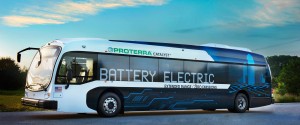California electric bus company Proterra has broken a new world record. The company’s newest 40ft Catalyst E2 Max bus traveled up to 1,102.2 miles in one charge.
The previous world record set by an electric vehicle was 1,013.76 miles. The record was made by a vehicle up to 46 times lighter than Proterra’s bus.
Proterra’s vehicle is still on the testing site in New Carlisle, Indiana, but the bus’ speed and energy efficiency prove to be a positive outlook for the future of electric buses.
Electric vehicles have been on the rise throughout the world. According to the Wisconsin State Journal, the city of Madison has recently purchased three battery-powered buses and plans to put them in use by 2019. The goal for many world cities is to reduce air pollution.
“As we see incumbents and more companies enter the heavy-duty EV market, it has become very apparent that the future is all-electric, and the Sun is setting on combustion engine technology,” said Ryan Popple, Proterra’s chief executive.
Electric vehicles may be greener and more effective for protecting the environment. However, for the sun to truly set on the combustion engine, electric vehicles must first be made available to the common American.
According to the Wisconsin State Journal, a single electric bus costs up to $667,000, totaling up to $2 million for Madison’s first three electric public transit vehicles.
It’s true that many Americans utilize motorcoaches to get from place to place. Every year, motorcoaches account for a total of 751,000,000 passenger trips. These passenger trips are especially important to senior Americans who often make up approximately 50% of motorcoach travelers.
Because nearly 84% of those who are older than 65 are struggling with heart disease and pass away from complications, motorcoach travel is almost always the easiest way for older citizens to see the sights without health risk.
Yet motorcoaches and public transit vehicles aren’t the personal vehicles of American citizens. Therefore, despite the movement of electric buses, until the electric car becomes as affordable to the middle-class American as a combustion engine vehicle, the combustion engine won’t be headed out the door anytime soon. Until then, the only thing that may be replaced is a family vehicle’s clogged air filters, which can improve gas mileage up to 14%.
Still, the advancements in electric vehicles remain what Proterra is calling a major feat according to BBC News. The company’s new bus uses a battery of 660kWh energy storage capacity, revolutionizing the electric vehicle industry by improving the ability for larger vehicles to be electric, not just small cars.
“The makers of this bus prove that really all you need is a bit of ambition and determination,” said Rosie Rogers, a campaigner with Greenpeace. “If only our biggest mass-market carmakers had this kind of drive to tackle air pollution and improve the health and lives of the public.”
Photo: Proterra.com







